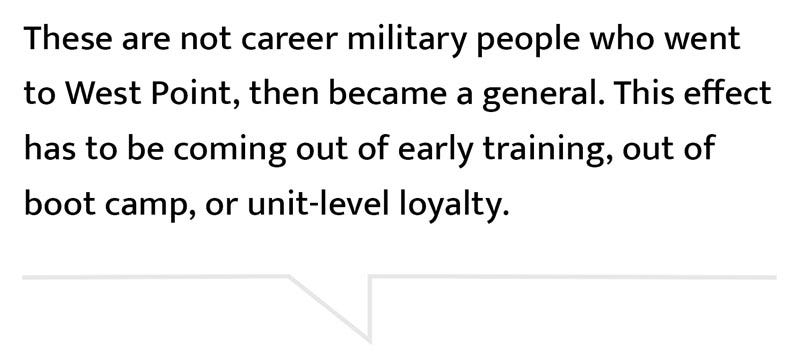Looking for a Trustworthy CEO? Hire a Military Vet
For companies hoping to avoid hassles with the IRS, financial restatements, or class-action lawsuits, consider a military background for your top brass

By Steve Brooks
CEOs set more than just policies: They set the overall tone for a company. While consulting for the Internal Revenue Service, McCombs Accounting Professor Lillian Mills learned that the tone can even touch on taxes.
IRS colleagues told her of a common scenario. Under one CEO, a company cooperates with audits and doesn’t claim questionable deductions. Then a new boss moves in. “Within a few years, that taxpayer is more difficult to deal with,” she says. “It’s less helpful with providing documents and more aggressive with tax claims.”
She wondered how widespread the CEO effect might be — and whether anything in an executive’s background might help to predict a firm’s tax strategy. Some existing studies suggested that an armed forces connection might be a factor. CEOs who were military veterans drew fewer charges of corporate fraud, while small businesses near military bases were more likely to report all their income than those located elsewhere.
Would firms with former soldiers as CEOs be less likely to dodge corporate taxes?
To test the link, Mills and Kelvin Law of the Nanyang Business School in Singapore looked at 4,886 CEOs of S&P 1,500 companies from 1992 to 2011. To ferret out military resumes, they consulted directories by Marquis Who’s Who.
The researchers checked a wide range of characteristics, from age and gender to education and political affiliation. Military experience was the only one that correlated with effective tax rates: taxes as a percentage of corporate income. Firms with military CEOs paid rates 1.8 percent higher than firms without, averaging an extra $1 million to $2 million a year, and that can be a plus for boards taking a conservative approach to accounting.

Mills says that while shareholders, especially those diversified across multiple companies, would probably prefer a CEO who’s tax-avoidant, the traits that make military CEOs more conservative when it comes to paying taxes also tend to mean they’re conservative about other areas of financial reporting, such as “backdating, restatements, and accruals that make earnings look better, and they head firms that are less likely to face class-action lawsuits,” she adds.
Additionally, compared to those with non-military CEOs, these firms set aside half as much to cover shaky deductions that the IRS might later disallow. Firms headed by military CEOs also had 12 percent fewer operations in countries that are commonly considered tax havens, like the Cayman Islands and Ireland.

Length of service didn’t matter: The average veteran had completed four years, but more time in the military didn’t result in CEOs who paid more in taxes. “These are not career military people who went to West Point, then became a general,” says Mills. “This effect has to be coming out of early training, out of boot camp, or unit-level loyalty.”
What exactly causes that effect is a question for future research, she adds, but it extends beyond taxes. Service backgrounds also corresponded with fewer class action lawsuits and fewer financial restatements — suggesting that in gray areas of money management, those firms routinely avoided ethically dubious accounting practices.
When Mills shared her results with an ex-military CEO, he added that he also rejected actions like investing in tax shelters unless they also furthered the company’s mission. “He wasn’t just interested in doing it for the tax savings,” she recounts.
Taking a Second Look at Vets
If a board wants to pay as little as possible in taxes, it might steer away from a CEO who has been in uniform, says Mills.
On the other hand, if it’s looking to avoid hassles with the IRS — not to mention, accounting scandals and lawsuits — it might give that candidate preferential treatment. “If the board’s preference is for a more conservative set of financial policies overall,” she says, “military service seems to be one indicator.”
Unfortunately, she adds, such experience is getting harder to find. In 1992, 21 percent of CEOs had spent time in the armed forces. By 2011, the number was down to 6 percent.
Even so, she says, “Our overall findings provide another impetus for hiring people with military experience into roles where companies need trustworthy judgment. It’s why companies should take second looks at veterans.”
The Study
Military Experience and Corporate Tax Avoidance is published in the Review of Accounting Studies.
Originally published at www.texasenterprise.utexas.edu on May 10, 2017.
About this Post
Share:


